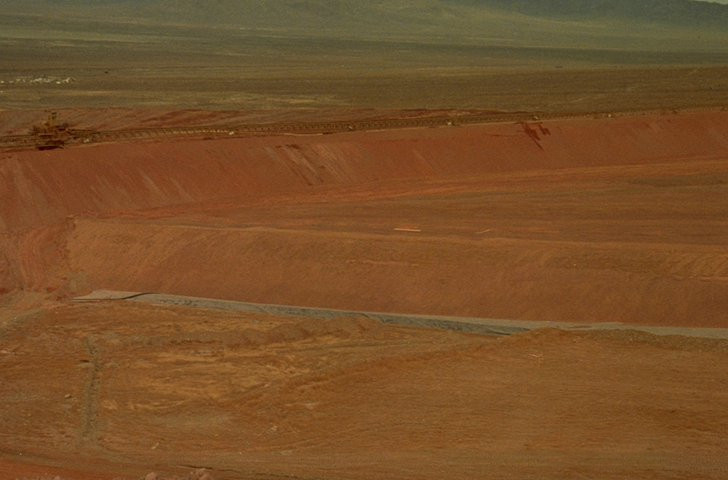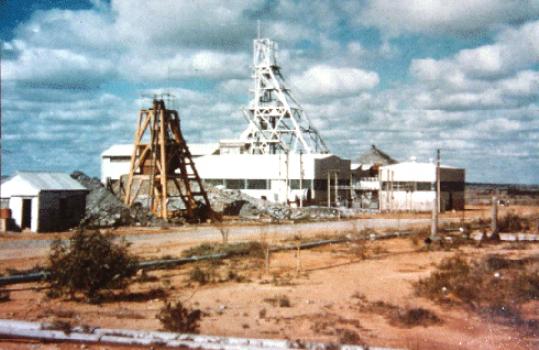|
Lake Way
Lake Way is a dry saline lake located in the Mid West region of Western Australia, approximately south of Wiluna. It also gives its name to a nearby cattle station, the Lake Way Station. Description The lake, dry except during exceptional floods such as occurred in 1900, 1942, 1963, repeatedly from 1992 to 2001 and in 2006, runs roughly parallel to the Leinster-Wiluna road, which is part of the Goldfields Highway. The lake is the site of one of the most advanced uranium mining projects in Western Australia, the Centipede–Lake Way project, which is pursued by Toro Energy. Toro Energy has acquired the Lake Maitland uranium project and in 2010 proposed to operate both projects. Mining Gold The lake has been the site of an open-pit gold mining operation, which was part of the Wiluna Gold Mine. The ''Williamson'' pit, located within the lake and accessed through a causeway, was mined from 2005 to 2007, but the pit only contained low grade ore of approximately 1.75 g/t. Af ... [...More Info...] [...Related Items...] OR: [Wikipedia] [Google] [Baidu] |
Western Australia
Western Australia (commonly abbreviated as WA) is a state of Australia occupying the western percent of the land area of Australia excluding external territories. It is bounded by the Indian Ocean to the north and west, the Southern Ocean to the south, the Northern Territory to the north-east, and South Australia to the south-east. Western Australia is Australia's largest state, with a total land area of . It is the second-largest country subdivision in the world, surpassed only by Russia's Sakha Republic. the state has 2.76 million inhabitants percent of the national total. The vast majority (92 percent) live in the south-west corner; 79 percent of the population lives in the Perth area, leaving the remainder of the state sparsely populated. The first Europeans to visit Western Australia belonged to the Dutch Dirk Hartog expedition, who visited the Western Australian coast in 1616. The first permanent European colony of Western Australia occurred following the ... [...More Info...] [...Related Items...] OR: [Wikipedia] [Google] [Baidu] |
2008 Western Australian State Election
The 2008 Western Australian state election was held on Saturday 6 September 2008 to elect 59 members to the Legislative Assembly and 36 members to the Legislative Council. The incumbent centre-left Labor Party government, in power since the 2001 election and led since 25 January 2006 by Premier Alan Carpenter, was defeated by the centre-right Liberal Party opposition, led by Opposition Leader Colin Barnett since 6 August 2008. The election resulted in a hung parliament with no party gaining a majority. Labor was two seats short of a majority in the expanded legislature. Ultimately, the Liberals were able to form a coalition government with the WA Nationals, supported by three independents. While both parties agreed to National demands that at least 25 percent of mining proceeds go to regional projects, the Nationals ultimately went with the Liberals. According to Nationals leader Brendon Grylls, a Labor-National coalition would have required Green support to get mining l ... [...More Info...] [...Related Items...] OR: [Wikipedia] [Google] [Baidu] |
Department Of Mines And Petroleum
The Department of Mines and Petroleum was a department of the Government of Western Australia until it was superseded by the Department of Mines, Industry Regulation and Safety on 1 July 2017.About DMIRS Department of Mines, Industry Regulation and Safety, accessed: 30 May 2018 The department was formed on 1 January 2009, out of the former and , which were split into three new depar ... [...More Info...] [...Related Items...] OR: [Wikipedia] [Google] [Baidu] |
Robin Chapple
Robin Howard Chapple (born 11 February 1947) is an Australian politician. From 2001 to 2005 Chapple represented the Mining and Pastoral Region for the Greens. He was defeated in the 2005 state election but was re-elected in the 2008 election, serving until his retirement in 2021. Chapple was Greens spokesperson for aboriginal issues, energy and climate change, local government, mines and petroleum, nuclear issues, pastoral issues, ports, racing and gaming, regional sustainability, state development and industry, and waste management. Early life Chapple was born in Wheathampstead, England in 1947. In his youth, he worked as a junior stockbroker at the London Stock Exchange, as a qualified automotive mechanical engineer in the British sports automotive industry, and in industrial farming industries in England. He later travelled to work with Oxfam in what is now Bangladesh. Chapple emigrated to Australia in 1974 and worked throughout the Central Desert area and northern A ... [...More Info...] [...Related Items...] OR: [Wikipedia] [Google] [Baidu] |
The Sydney Morning Herald
''The Sydney Morning Herald'' (''SMH'') is a daily compact newspaper published in Sydney, New South Wales, Australia, and owned by Nine. Founded in 1831 as the ''Sydney Herald'', the ''Herald'' is the oldest continuously published newspaper in Australia and "the most widely-read masthead in the country." The newspaper is published in compact print form from Monday to Saturday as ''The Sydney Morning Herald'' and on Sunday as its sister newspaper, '' The Sun-Herald'' and digitally as an online site and app, seven days a week. It is considered a newspaper of record for Australia. The print edition of ''The Sydney Morning Herald'' is available for purchase from many retail outlets throughout the Sydney metropolitan area, most parts of regional New South Wales, the Australian Capital Territory and South East Queensland. Overview ''The Sydney Morning Herald'' publishes a variety of supplements, including the magazines ''Good Weekend'' (included in the Saturday edition of ''Th ... [...More Info...] [...Related Items...] OR: [Wikipedia] [Google] [Baidu] |
Donna Faragher
Donna Evelyn Mary Faragher (née Taylor; born 12 September 1975) is an Australian politician who has been a Liberal Party member of the Legislative Council of Western Australia since 2005, representing East Metropolitan Region. She became a minister in the government of Colin Barnett in 2008, becoming the youngest woman to hold ministerial office in Western Australia. Early life Faragher was born in Perth to Joan Betty Light and Donald Franklin Taylor, both of whom were police officers. She attended primary school at Guildford Grammar School and secondary school at Perth College. Faragher then went on to the University of Western Australia, graduating with an initial Bachelor of Arts degree and later completing a Master of Education. She was federal secretary of the Australian Liberal Students' Federation in 1997. [...More Info...] [...Related Items...] OR: [Wikipedia] [Google] [Baidu] |
Heap Leach
Heap leaching is an industrial mining process used to extract precious metals, copper, uranium, and other compounds from ore using a series of chemical reactions that absorb specific minerals and re-separate them after their division from other earth materials. Similar to in situ mining, heap leach mining differs in that it places ore on a liner, then adds the chemicals via drip systems to the ore, whereas ''in situ'' mining lacks these liners and pulls pregnant solution up to obtain the minerals. Heap leaching is widely used in modern large-scale mining operations as it produces the desired concentrates at a lower cost compared to conventional processing methods such as flotation, agitation, and vat leaching. Additionally, dump leaching is an essential part of most copper mining operations and determines the quality grade of the produced material along with other factors Due to the profitability that the dump leaching has on the mining process, i.e. it can contribute substanti ... [...More Info...] [...Related Items...] OR: [Wikipedia] [Google] [Baidu] |
Anti-nuclear Movement In Australia
Nuclear weapons testing, uranium mining and export, and nuclear power have often been the subject of public debate in Australia, and the anti-nuclear movement in Australia has a long history. Its origins date back to the 1972–1973 debate over French nuclear testing in the Pacific and the 1976–1977 debate about uranium mining in Australia.Koutsoukis, Jason (25 November 2007)Rudd romps to historic win''The Age''. Retrieved 15 December 2010. Several groups specifically concerned with nuclear issues were established in the mid-1970s, including the Movement Against Uranium Mining and Campaign Against Nuclear Energy (CANE), cooperating with other environmental groups such as Friends of the Earth and the Australian Conservation Foundation.McLeod, Roy (1995). "Resistance to Nuclear Technology: Optimists, Opportunists and Opposition in Australian Nuclear History" in Martin Bauer (ed) ''Resistance to New Technology'', Cambridge University Press, pp. 171–173. The movement suffered a ... [...More Info...] [...Related Items...] OR: [Wikipedia] [Google] [Baidu] |
Australian Bureau Of Agricultural And Resource Economics
The Australian Bureau of Agricultural and Resource Economics and Sciences (ABARES) is a federal research branch of the Australian Government Department of Agriculture, Water and the Environment, located in Canberra, Australia. ABARES was established on 21 August 1945 as the Bureau of Agricultural Economics (BAE), and is also involved in commercial consultancy. It was merged with the Bureau of Rural Sciences (BRS) in 2010. The main role of ABARES is to provide "professionally independent data, research, analysis and advice that informs public and private decisions affecting Australian agriculture, fisheries and forestry”. ABARES maintains thAgSurf databasewhich includes farm survey data on farm performance, production benchmarks, farm management, socioeconomic indicators relating to the grains, beef, sheep and dairy industries in Australia. ABARES has received funding from business and industry groups. ABARES' website notes that "Over half of ABARES' external revenue is derived fr ... [...More Info...] [...Related Items...] OR: [Wikipedia] [Google] [Baidu] |
Lake Way Mine
The Wiluna uranium mine is a proposed uranium mine in Western Australia. The mine project, owned by Toro Energy Ltd, is located south of the mining town of Wiluna. The original proposal was to establish open cut mines at Lake Way and Centipede deposits."Toro Energy gets EPA greenlight for Wiluna uranium project" ''Perth Now''. In 2013, the Wiluna project became the first uranium mine to receive all necessary approvals in the state of Western Australia since the ban on uranium mining was repealed there in 2008. Federal environmental approval for the mine's development was granted under the |
Lake Maitland
Lake Maitland is a dry salt lake located approximately south east of Wiluna, in the Mid West region of Western Australia. Mining project The Lake Maitland project was being pursued by Canadian company Mega Uranium. Mega teamed up with Australian company Toro Energy Pty Ltd in 2013, Toro Energy have an active proposal to mine uranium at Lake Way - incorporate two uranium deposits - Lake Way and Centipede. Toro Energy submitted a referral to the WA and Federal Government in 2014 to include the Lake Maitland and Millipede deposits to the existing proposal to mine Lake Way and Centipede. The proposal is to now to mine 4 deposits across 2 lake systems. It is one of four advanced uranium mining projects, the others being the Lake Way uranium project, Yeelirrie uranium project, and Kintyre uranium deposit. Uranium mining project The U3O8 Lake Maitland project, pursued by Mega Uranium, and the 680 tonnes U3O8 Centipede–Lake Way project undertaken by Toro Energy, located at ... [...More Info...] [...Related Items...] OR: [Wikipedia] [Google] [Baidu] |
Lake Maitland Mine
The Wiluna uranium mine is a proposed uranium mine in Western Australia. The mine project, owned by Toro Energy Ltd, is located south of the mining town of Wiluna. The original proposal was to establish open cut mines at Lake Way and Centipede deposits."Toro Energy gets EPA greenlight for Wiluna uranium project" ''Perth Now''. In 2013, the Wiluna project became the first uranium mine to receive all necessary approvals in the state of Western Australia since the ban on uranium mining was repealed there in 2008. Federal environmental approval for the mine's development was granted under the |


.jpg)


